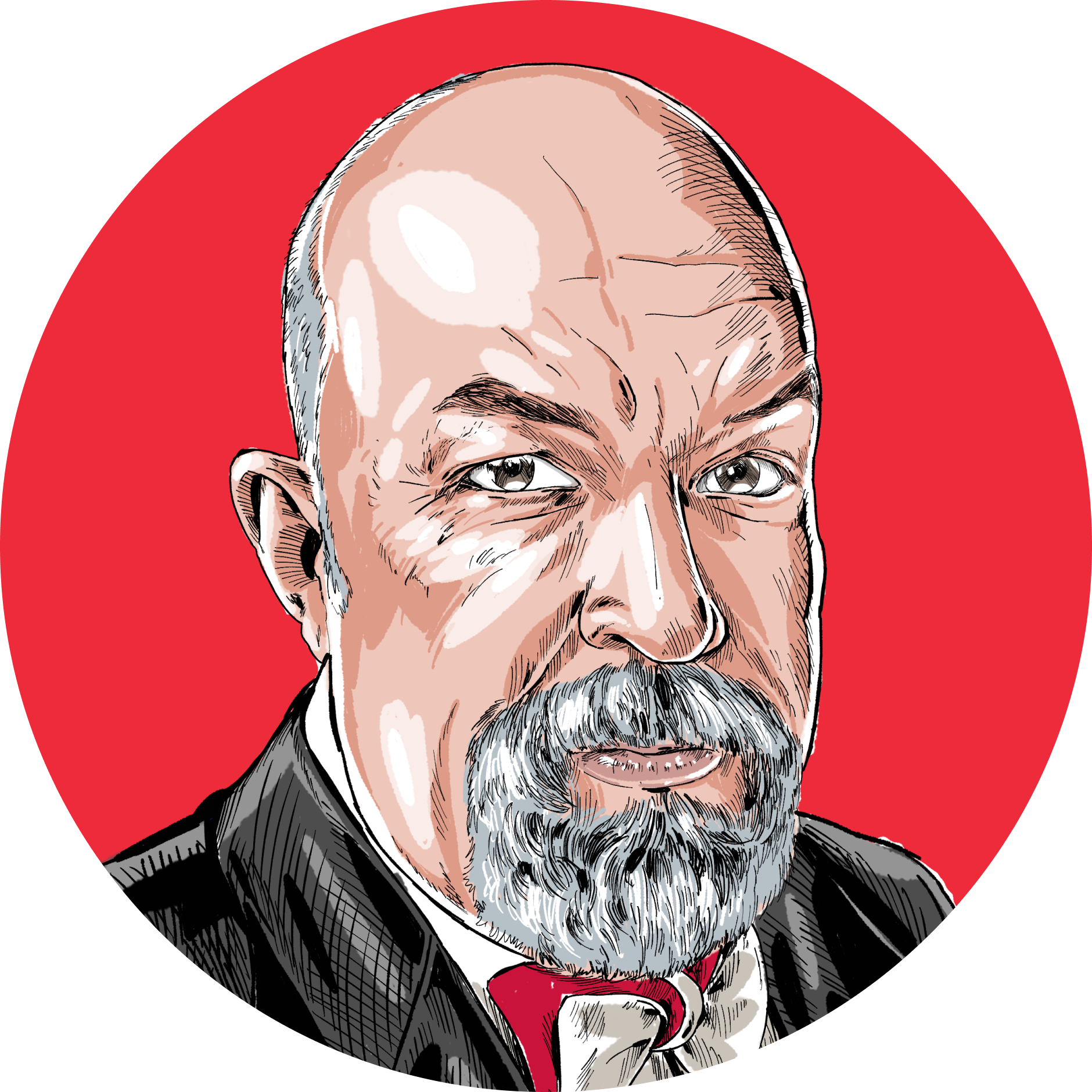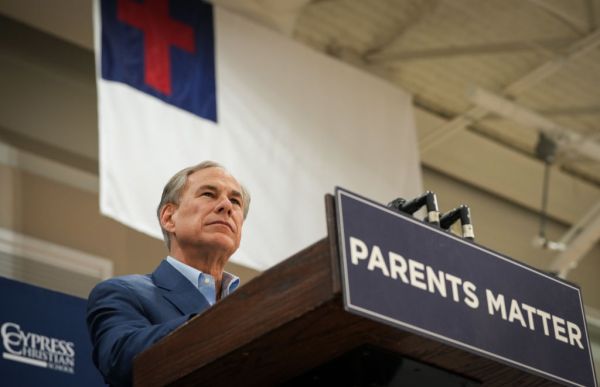If you’ve ever spent much time in court, then you know that “courtroom drama” is a genre in the entertainment world but something like an oxymoron in the real one—and the impeachment trial of Texas Attorney General Ken Paxton was no different. Despite all the bad-juju Texas weirdness and inherent drama involved—Paxton’s prim-faced and humiliated wife is one of the senators hearing, but in her case prohibited from voting on, the impeachment articles spurred by Paxton’s cringe-inducing extramarital shenanigans—the proceedings got off to a predictable and dead-boring start, with Paxton’s team introducing a raft of hopeless pretrial motions in an effort to have articles dismissed or evidence suppressed. A majority of the lawmakers in Texas’ Republican-dominated state Senate voted against Paxton’s weasel-out motions, but the typical handful of diehards, crazies, and goons who take their marching orders from talk radio indulged the disgraced, impeached, indicted (on federal securities-fraud charges) miscreant who, incredibly enough, happens to be the top law-enforcement officer in second-most-populous state in the country.
The plea responses from Paxton’s lawyer were histrionic:
“Attorney General Ken Paxton is innocent and therefore pleads not guilty!”
“Those allegations are all untrue, therefore Ken Paxton pleads not guilty!”
“Everything she just said right there was false, therefore attorney General Ken Paxton pleads not guilty!”
Over and over and over. Eventually, after reaching the 10th article, the impeachment counsel complained and the presiding officer told Paxton’s lawyers to knock it off with the speechifying and just plead already.
None of Paxton’s dismissal motions earned more than 10 of a possible 31 votes in favor—and most fell far short of that—meaning enough state senators have thus far been siding against the attorney general to surpass the two-thirds majority needed to give him the big pointy Texas boot. If Paxton is convicted on any of the charges, he will be removed from his post. A separate vote would then be held on the question of whether to bar him from public office for the rest of his life. It may take the better part of a month to finish the trial and reach a verdict.
Among those voting against Paxton was GOP State Sen. Bryan Hughes of Mineola, a longtime Paxton ally (and former roommate, at that) who is himself mixed up in the shenanigans at issue and can now expect a right-wing primary challenge. Paxton also found himself abandoned by Republican state Sen. Donna Campbell of New Braunfels, who is close to Paxton’s wife and whose office once employed Paxton’s alleged mistress. A lot of this mess seems to have stemmed from the family-values Christian’s attempt to keep the affair quiet, although it was the worst-kept secret in Austin.
The old cliché is that “you couldn’t make this up,” but I dare you to try to write fictional satire that is more ridiculous than the true-crime facts of the case.
Ye gods, etc.
The impeachment articles against Paxton are pretty straightforward: He is accused of abusing the powers of his office to help out a politically connected real-estate investor in Austin, Nate Paul, who is himself under felony indictment (eight counts) for alleged crimes of a distinctly Trumpish nature (i.e., defrauding banks by lying about his assets and liabilities in order to obtain loans). Paxton, according to the articles of impeachment, essentially handed over the power of the attorney general’s office to that alleged criminal and con artist; in return, the charges say, that alleged criminal and con artist helped Paxton out by picking up some of the tab for various home renovations and—here’s where things first got messy—putting Paxton’s mistress on the company payroll, setting her up in Austin for the purposes of adulterous convenience.
The specifics are very … specific, but lawmakers accuse Paxton of trying to help out Paul with litigation involving a charity that had invested with—and was now suing—his company. Paxton allegedly gave Paul access to what should have been confidential information and at one point put out legal guidance to delay certain foreclosures as a favor to Paul. In exchange, Paxton received bribes from Paul in the form of the aforementioned home-improvement and adultery subsidies. When whistleblowers brought these allegations to the attention of federal law enforcement in 2020, Paxton embarked on a campaign of retribution and intimidation.
The Republican-led state legislature took relatively little interest in all of this until Paxton reached a multimillion-dollar settlement with the whistleblowers whose careers and reputations he had wrecked and then attempted to put taxpayers on the hook for the bill. In the course of all this, the impeachment articles say, Paxton “abused the public trust,” engaged in “dereliction of duty” and the “misapplication of public resources,” “violated the constitution and his oath of office,” partook in “misconduct, private or public, of such a character as to indicate his unfitness for office,” and—the really undeniable one in the view of many Texans—brought “the office of attorney general into scandal or disrepute.”
As state Rep. Andrew Murr, the impeachment manager, put it: “Paxton turned the keys to his office over to Nate Paul.”
Depending on how you want to look at it, Paxton’s lawyer kicked things off either by trying to work the refs or by preemptively conceding defeat: “Are we really going to get a fair trial here?” he demanded. “Is it even possible to get a fair hearing?”
One of the smartest observers of Texas politics I know put it confidently:
“Paxton goes.”
Democrats are enjoying the GOP-on-GOP political bloodshed, of course. Texas isn’t as Republican a state as you may have been led to believe—Democrats run the cities in Texas just like they more or less run the cities everywhere else in the country—but Texas Democrats do not have a lot of power at the state level. This is a relatively recent development: Texas was a largely Democratic state until George W. Bush managed a feat no incumbent governor of the state had before—he was elected to a second, consecutive four-year term. Bush was only the second Republican to hold the governor’s office since Reconstruction, and it would be well into his first term as president of the United States before Republicans finally gained control of the Texas state House. The GOP’s slog to power in Texas was long and slow, but it was thorough, and for 20 years, Texas has been, at the highest levels, effectively something like a one-party state.
But as is the case in Democratic-dominated cities like Washington or Philadelphia, the two-party tendency asserts itself within the dominant party where the other party is attenuated to the point of near irrelevance. In Texas, as in much of the country, the Republican Party is divided between what I’ll call the Normies and the Moonbats, between the reasonably moderate Chamber of Commerce types (never mind that “moderate” Texas Republicans today are far to the right of the typical member of, say, the Reagan Cabinet) and slavering talk-radio bedbugs who first started to coalesce into a real operative political faction during the Tea Party era and whose members found their champion/mascot in Donald Trump several years later. Trump, it turns out, provided the political template for Paxton—a kept creature of two crackpot oil tycoons and one Austin real-estate guy—who rages, from his desk in the attorney general’s office, against “insiders” and “the establishment.”
The thing is, Texas’ single-party domination doesn’t end up playing out the way you might expect. The state House has both Democrats and Republicans serving as committee chairs, and the legislature is more than a little bipartisan—particularly when it comes to money. When the state was awash with funding from Washington’s gusher of COVID aid, for example, lawmakers from both parties agreed not to jack up baseline spending and instead to use the money to set up a series of long-term endowments—some for boring quotidian stuff (maintenance of the state Capitol complex and the governor’s mansion), and some for bigger things like bolstering the state’s second tier of research universities. That ended up being a largely bipartisan project, and Democrats are keenly aware that people who work at those newly endowed universities are more likely to be pulling “D” levers than “R.”
While Democrats at the national level have been boosting Trump and Trump-adjacent loonies on the theory that elevating such Republican candidates leads to elections that Democrats are more likely to win, Democrats in Texas want the Republican Party to be run by Normies they can work with rather than Moonbats who would bring a bunch of Freedom Caucus energy to the state legislature. “The Democrats could be railing against Republicans right now, and they’re not,” says one longtime Republican observer of Texas politics. “They’re actually being adults about it.”
For the Moonbats, Public Enemy No. 1 in Texas isn’t some Houston Democrat ward-heeler you’ve never heard of, it is Dade Phelan, the Republican speaker of the House, who operates in a partially bipartisan fashion. Phelan is a conservative by any reasonable measure, but he is not an actual Moonbat, and howling moonbattery is what the true-believing Moonbat demands.
(As an aside, Dade Phelan is one of a long string of Texas politicians with weird cowboy-movie names; even the ones who look like they’ve just been jumped by both Brooks Brothers have such ridiculous names as “Briscoe Cain.”)
Paxton, whose only shot at survival is to flip some Normies to Team Moonbat, is being represented by a positively Trumpish and wildly oleaginous lawyer, Anthony Buzbee. Buzbee has a piece of a lot of celebrity-oriented litigation—Deshaun Watson’s sexual-misconduct accusers, the victims of Travis Scott’s Astroworld fiasco—and while he clearly doesn’t mind chasing a buck or a headline, his true love is politics, a profession at which he keeps failing in various amusing ways. Chairman of the Galveston County Democratic Party as recently as 2005, Buzbee once ran for the state House as a Democrat only to lose in a 17-point tail-whipping. Years later, he ran for mayor of Houston and lost by 14 points. He called himself a Republican for a few years—something about Donald Trump must have appealed to him—but he didn’t have much electoral luck in that party, either, and is now, at least on paper, an independent.
While preparing his defense of Paxton, Buzbee filed (on the last possible day) to run for a notionally nonpartisan Houston City Council seat. That may be why he seems a little distracted—and, boy, did he come off as befuddled at times on the opening day of the trial. He wasn’t clear about when his opening remarks were supposed to be delivered, for example, until the Senate’s presiding officer, Lt. Gov. Dan Patrick, told him, “You’re up!” At one point on Tuesday, he objected to one of his own team’s exhibits, producing a great display of bitter mirth on the part of prosecution counsel Rusty Hardin, who worried aloud that the moment might confuse any law students watching the proceedings.
Thus far, Buzbee’s defense of Paxton has relied heavily on declaring that various actions were not criminal, which even if true is of limited relevance, impeachment not being a criminal proceeding. As Murr, the impeachment manager, said in his opening statement, “We require more from our public officials than merely to avoid being a criminal.”
Buzbee has offered angry protestations that this is all being driven by “reporters with agendas” and “pundits” spurred on by a vindictive Speaker Phelan, whose resignation from leadership Paxton had once called for after a viral video emerged showing the speaker looking unsteady and slurring his words on the floor of the statehouse. “Phelan was so drunk while running House business, he could hardly hold the gavel,” Buzbee proclaimed. “Four days later, Ken Paxton issued a statement and called for Dade Phelan to resign. In response, the committee hurriedly met the next day, and recommended impeachment the day after that.” But it’s not as though this stuff came out of nowhere: Paxton was indicted on securities-fraud charges in 2015, less than a year into his first term in office as attorney general.
Even if Paxton is yanked out of the attorney general’s office—or thrown in the pokey!—the story of what he represents will be far from over.
The Lone Star State is growing richer and more cosmopolitan every year, becoming more like Austin—and the rest of the United States—and less like the Trans-Pecos. At the same time, it’s fixated ever more neurotically on the myth of its own uniqueness. Ask almost any Texan, and he or she will proudly tell you their home has a special relationship with the United States—including the option of leaving the Union if it decides to—that was enshrined in the treaty that annexed the former republic as a state. This is a complete fabrication, pure myth—but widely held as an article of faith, even taught in Texas history classes. The guys in the big hats, high-heeled boots, and F-350s with “Secede!” bumper stickers aren’t Panhandle cowboys or Lubbock County cotton farmers—they’re affluent professionals and country-clubbers in the suburbs of Houston, Dallas, and San Antonio. Some places have local pride—Texas has a psychosis.
A fair number of the people who are really driving that bus within the Republican Party are beneficiaries of the largesse of two brothers/oil tycoons/kinda-sorta cult leaders, Farris and Dan Wilks, who are big Paxton backers and the ones putting up the money to primary Republicans who refuse to turn a blind eye to the attorney general’s tomfoolery. Like many other characters in this story, they are practically literary figures: Raised poor by a bricklayer father, they built a masonry company and then got into fracking early, earning billions of dollars during the shale boom. They have provided some of the money behind PragerU and the Daily Wire, and they’re involved with some evocatively named institutions like the Thirteen Foundation and the Heavenly Fathers Foundation. Their parents were “disfellowshipped”—or excommunicated—by the Churches of Christ, and founded a new congregation, Assembly of Yahweh (7th day), of which brother Farris became pastor and “bishop.” Their theology is pseudo-Jewish (no Christmas!) and conspiratorial (“the true names of the Father and Son appeared in the original Scriptures, but were deleted … to appeal to the Gentiles by using the names of local gods”), and generally kooky in that great American choose-your-own-adventure school of entrepreneurial theology.
This is straight-up bonkers stuff, of course, but bonkers stuff with a lot of money behind it. And it’s not as though right-wing activism and right-wing media has any great fear of cults: The Washington Times is famously owned by the Moonies, a very special breed of Moonbat. But Moonbat money spends just like any other legal tender. “Wait till you see my PAC budget,” boasted Jonathan Stickland, the “recovering politician” who will be directing that sweet Wilks money into primary campaigns on behalf of—let’s get this straight—a politician who is at least plausibly crooked and a straight-up, stone-cold philanderer. Weird that Warren Kenneth Paxton Jr., of all unlikely specimens, is the one these devout and pious types are so eager to prop up. Weird that these men and women of faith don’t have higher expectations of the people with whom they invest their power and resources. Weird that this doesn’t seem to prick their consciences even a little bit.
But these are weird times in a weird place.









Please note that we at The Dispatch hold ourselves, our work, and our commenters to a higher standard than other places on the internet. We welcome comments that foster genuine debate or discussion—including comments critical of us or our work—but responses that include ad hominem attacks on fellow Dispatch members or are intended to stoke fear and anger may be moderated.